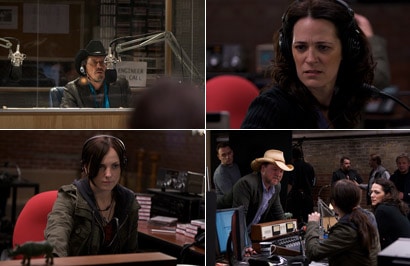Review by Haley Cullingham
In the basement of an old church in the Junction, Bruce McDonald, the rogue captain of Canadian cinema, is staging a small-scale film revolution. Leading by example, McDonald is making films his way, in his city-despite many of his colleagues defecting to cheaper pastures. McDonald is passionate about keeping film alive in Toronto. “If you don’t have a home-grown industry, you don’t have an industry, you know? I think it’s very important that we’re telling our own stories about our own places.” Shooting in one location over 30 days on the new Sony Red-Cam, McDonald’s latest project, Pontypool, is testing the boundaries of the Canadian film industry, of filmmaking in general, and his own boundaries as a director. Not only is he filming chronologically, (Crazy!), but “we’re hoping, if all goes well, to have it done for September, for possible entry into the Toronto Film Festival. Fingers are crossed,” McDonald grins from beneath his cowboy hat. A lofty goal, even for such an accomplished industry veteran.
McDonald has already directed eight feature films, including Highway 61, Hard Core Logo and his most recent effort, The Tracey Fragments. With it’s experimental cinematography and deep subject matter, the film has achieved massive critical success. Fragments stars Ellen Page, Canadian cinema’s femme du jour, and McDonald has selected another independent, charming brunette to play in Pontypool, British import Georgina Reilly. Reilly plays ex-army chick and radio technician Laurel Ann Drummond. “She’s kind of quirky and laid-back,” Reilly says, and describes working with McDonald (for her second time) in the wake of such a huge success as “very surreal,” a feeling that echoes the plot of the movie itself. “I’ve never been trapped in a radio station while there was a crazy virus going on, so that’s definitely something you kind of have to work yourself into.”
The virus in question spurs random fits of violence among the townspeople of Pontypool, Ontario, and is spread by the English language. Trapped in the radio station, Laurel Ann, recently fired Shock Jock-turned small town radio host Grant Mazzy (played by Stephen McHattie), and producer Sydney Briar (Lisa Houle) have to decide whether calling for help will save the town-or risk spreading the virus over the airwaves and around the world. It’s a unique situation, and the small cast and single location provide interesting challenges for the three actors. The chronological filming, though, helps the actors develop the tension. “It’s so much better for an actor,” Reilly says. McDonald continues, “It’s organic, you’re building on things, little accidents that happen on a set, you can actually weave those little things into the fabric of the narrative.”
Based on the novel by Tony Burgess, who also wrote the screenplay, Bruce has been thinking about the story for years. Putting together a condensed version for a CBC radio play finally convinced him that Pontypool could make “a really great little movie”, and it was optioned just three months ago over beers at the Horseshoe Tavern. In addition to the ground-breaking production style, it’s also McDonald’s first foray into the horror genre. And just in case filming an entire movie in three weeks in a church basement wasn’t ambitious enough, anyone confused and terrified by the flash snowstorm outside the Victoria-Royce Presbyterian Church in the Junction last friday was just walking past another Bruce McDonald moment-a blizzard scene in Toronto at the beginning of summer. Even the atmosphere won’t stand in Bruce McDonald’s way.



 Follow Us On Instagram
Follow Us On Instagram
